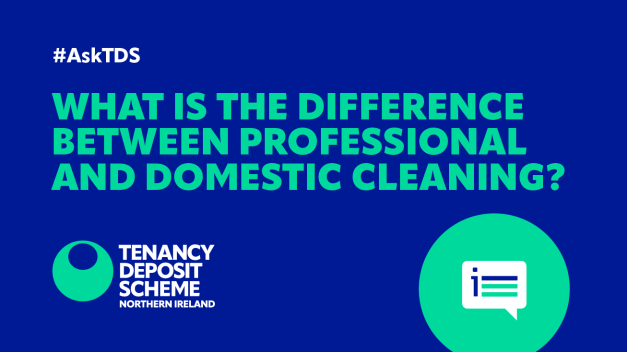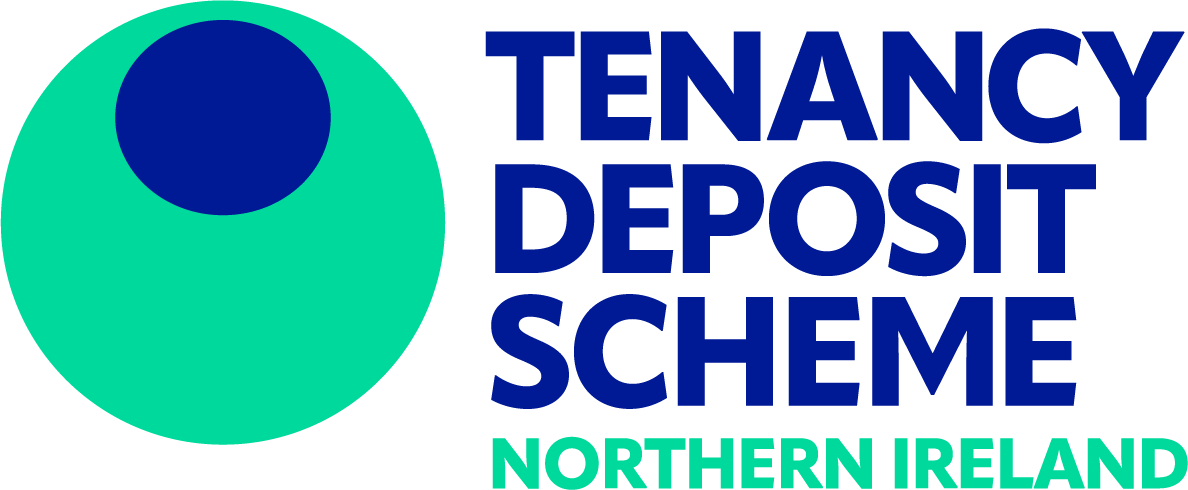AskTDSNI: "What is the difference between professional and domestic cleaning?"

In this week’s AskTDS, we answer a popular question from tenants, “what is the difference between professional and domestic cleaning?”
When it comes to cleaning, one person’s view of cleanliness can differ from another, regardless of whether they are a landlord, tenant or owner occupier. It is important that tenants be aware that cleaning is not subject to fair wear and tear, meaning even if something was damaged when you moved in, it should still be clean when you move out.
Do I need to pay for a cleaner when I move out?
Most tenancy agreements state that a property should be cleaned to a ‘professional standard’ at the end of a tenancy. However, this does not mean you must use a professional cleaner. In fact, it is illegal for an agent or landlord to insist you use a professional cleaner. If you are looking to save money you could clean the property yourself, but be warned, over half of all deposit disputes include claims for cleaning. Below are some tips to help you understand what ‘cleaned to a professional standard’ entails, but there is no guarantee you’ll avoid a dispute.
What does clean to a professional standard entail?
Cleaning to a professional standard, while hard to define exactly, generally means cleaning to a high standard. Imagine wiping every surface including covered spaces such as under sofas, or behind doors while wearing white gloves.
Professional cleaning will also cover the cleaning of items such as the extractor fan grills, dusting light bulbs and cleaning the windows.
Here are some of the tasks you might be expected to complete if cleaning to a professional standard:
- Empty all rubbish and replace rubbish bags
- Remove cobwebs, dust skirting boards
- Dust ceiling fans and light fixtures
- Clean window sills and wipe down doors
- Dust all furniture including bottoms and sides
- Clean all glass surfaces including smudges on windows
- Clean and disinfect bathrooms (dust light bulbs and wipe down cabinets)
- Sweep, vacuum or mop all floors
- Clean kitchen (including inside microwave, top of refrigerator)
- Defrost fridge/freezer and deep clean the oven, hob and extractor
- Wipe down kitchen cabinet facings
- Polish all glass surfaces and stainless steel in kitchen
While this may seem like a long list, professional cleaning services can be expensive, so tenants could save themselves from a cleaning charge if they spend the time and effort to clean as thoroughly as they can.
What will the landlord do if I clean, but not to a professional standard?
There is no ‘one size fits all’ answer to this, as it depends on the recorded cleanliness of the property at the start and end of the tenancy, what is in the tenancy agreement and other factors. For simplicity’s sake, let’s make a few assumptions. First, assume that it states in the tenancy agreement that the property must be cleaned to a professional standard and that the property was noted as ‘professionally cleaned’ in the check-in report. Let’s also assume that while the property is clean on the check-out report, there are areas that weren’t cleaned to a professional standard – e.g. the oven wasn’t cleaned, and the shower had the early signs of mould in the grout.
In this case, the landlord would be able to make a good case for a compensatory amount to be deducted from the tenant’s deposit. Therefore, it is incredibly important for you to be aware of the cleaning standard of the property at the start of the tenancy and ensure this is noted in the check-in report.
While a domestic level of cleaning is fine during the tenancy, a deeper, more professional standard of cleaning would usually be necessary for the end of a tenancy.
For more tenant tips, please visit our tenant FAQ page.
About TDS
Tenancy Deposit Scheme (TDS) is a government-approved scheme for the protection of tenancy deposits; TDS offers both Insured and Custodial protection and also provides fair adjudication for disputes that arise over the tenancy deposits that we protect.
We provide invaluable training in tenancy deposit protection and disputes for agents and landlords through the TDS Academy as well as joining with MOL to provide the Technical Award in Residential Tenancy Deposits.
TDS Insured Scheme: where a TDS member can hold the tenancy deposits as stakeholder during the term of the tenancy.
TDS Custodial Scheme: where TDS hold the deposit for the duration of the tenancy.
TDS Academy: TDS provides property professionals with invaluable training in tenancy deposit protection and tenancy deposit disputes.
TDS Northern Ireland: TDS is Northern Ireland's leading and only not for profit tenancy deposit protection scheme.
TDS can only comment on the process for our scheme, other deposit protection schemes may have a different process/require different steps. Content is correct at the time of writing.
- Tagged:
